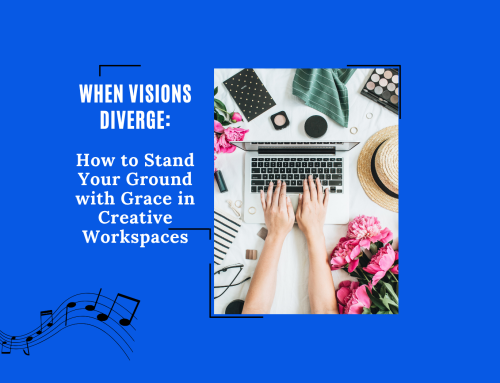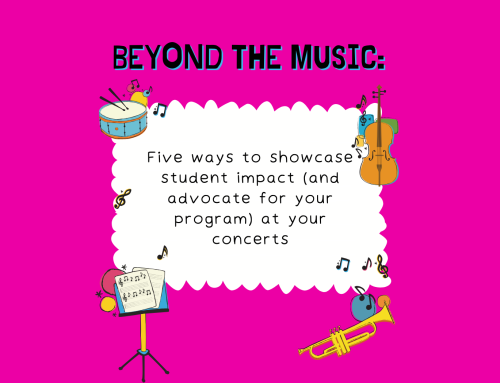As a young educator, I was always tasked with the question: why does music matter? It was something asked incessantly. There were textbook answers that got me through job interviews, but the one person I never really convinced was myself. I knew why I was a teacher- I’ve never doubted wanting to be a teacher. I care deeply about my students and their success, but why was I teaching music specifically?
Recently, I have been revisiting this question more and more in an era of COVID-teaching. I am admittedly angry that the arts are losing a decades-long advocacy battle throughout this tumultuous time. It’s easy to complain and rant without a resulting action as one angry teacher. I have worked on answering my “why music” question for many weeks now. It was one of many internal struggles I faced during these last few months, and to see the bigger picture, it helped to zoom out from teaching music and start with answering why the arts are important in general.
I often ask my students, “why did you sign up for orchestra?”. I receive the same answers every year… “my mom made me start in third grade, and I was kind of good at it” or “I like seeing my friends” and my personal favorite, “I don’t know… I guess I kind of like it” followed by a shrug. Most of my students don’t put thought into why they are doing a task that they have spent years doing, and beyond that, they don’t consider the larger cultural education they receive.
Thinking towards the future
I follow these questions with a conversation about my students’ potential futures every once in a while. I might ask a student what they want to be when they grow up. Common answers include engineers, doctors, nurses, computer scientists, military, trade jobs, teachers, etc. I then ask the students why they choose a job and then why the job is important and how or why the job adds to society and so on and so on. Students inevitably conclude that they work to provide for themselves and their (future) families so they can enjoy life together. We acknowledge that work can make you feel fulfilled and useful personally while contributing to society. But at the end of the day, the consensus is that we wish to provide a life for ourselves doing things we enjoy.
Students often will note that they want to produce a tangible product of some kind. Still, the conclusion is generally that the invention, product, or work process makes complicated processes easier and long processes faster so that people can expend minimum effort for the maximum reward to then hurry up and do leisurely, enjoyable things in safe and worry-free ways. For example, nurses, doctors, or even products like medication make you feel better so you can live life in a healthy, pain-free way. Electricians run wires so we can have lights on while we do something else. Cars are engineered and manufactured so we can travel to do other things. Chemicals are used to create products that we use in everyday life for ease, remediation, beautification, or to make other inventions run potentially. Contractors work to build a shelter so we can be safe and comfortable while doing other things. The examples are endless.
So, my next question is then, “how do you enjoy life- what is it you do in your spare time when you’re not ‘working’?” Video games, concerts, sports, cooking, dining out, seeing movies, shopping, and so on fills most peoples’ spare time. When I ask, again, why they choose these activities to fill their spare time, the answer is mostly the same: “it makes me happy.”
Joy in entertainment
Most of everything we enjoy in our leisure time includes some form of entertainment (and yes, that includes sporting events). This could mean putting on some background music as you hang out with friends or family over a great meal. It could mean bingeing a TV series by yourself with popcorn or shopping the latest trends in fashion. It could also mean updating an old house or going to a museum. It could mean going to a bar to have a perfectly crafted beer in the properly designed glass and watching a football game littered with colorful graphics, epic theme music, and fun commercials. Even a great chef includes elements of art as one hopefully would excite the senses of taste or smell– they might even plate a dish with interesting visual elements. Most of these events or activities have graphic/visual design, music, sound production, art, movement, emotion, and so on ingrained into the very foundation of its production. These elements were created by artists to entertain and inspire happiness among their consumers.
Lately, the word “essential” has been thrown around a lot regarding what items, what people, and what jobs are “essential” in our world today. The arts have taken a considerable hit financially as shows, sports, concerts, events, and so on have been canceled or moved to a virtual format. Rather ironically, but to no one’s surprise, many people turn to the arts for comfort in difficult times– tv, radio, music, and other means of entertainment. Yet, there is an uncomfortable amount of discussion about lessening support for the arts in our country and around the world.
What does support mean?
When we talk about not supporting the arts, we are, of course, talking about not defending our already struggling opera houses and concert halls. But we are also talking about not supporting parents knowing nursery rhymes to sing to their children. We’re talking about not supporting great food, visually beautiful buildings and homes, and awe-inspiring tv, video games, and movies. We’re talking about not supporting imagination and creative, empathetic minds. We’re talking about not supporting our culture and the culture of others but, most importantly, our happiness.
So when we talk about what is” essential,” consider if you ‘live to work’ or ‘work to live’… even when times are difficult. Then ask yourself if you feel happiness is essential. I would certainly make the case that it is, and therefore… so are the arts.




Leave A Comment